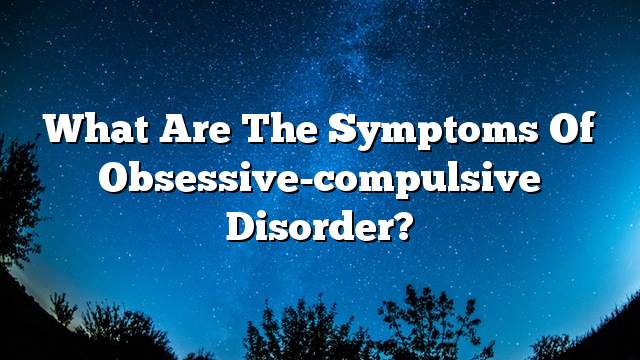Obsessive-compulsive disorder
Obsessive-compulsive disorder is defined as a disease of the nervous system. It is one of the types of mental illnesses that affect the life of the individual negatively. The patient behaves in a manner that causes discomfort to those around him. Therefore, care must be taken to deal with these cases in special ways and to subject the patient to treatment. The disease.
Symptoms of obsessive-compulsive disorder
Obsessive-compulsive disorder symptoms differ from one patient to another. There are a number of ideas that occupy the patient’s mind in an annoying manner, in addition to some compulsive behaviors that he acts.
- The constant fear of pollution or pollution.
- Feeling afraid of causing harm to people around him.
- The extreme fear of committing any mistake, whether inappropriate behavior, or a certain failure.
- The desire to regulate things too much.
- lack of self confidence.
- Wash your hands or shower frequently.
- Refuse to shake hands with others or touch knobs or doors.
- Check things accurately and repeat like inspecting lock doors.
- Repeated counting continuously whether loud or silently during the performance of daily work.
- Eat a certain quality of food, according to a fixed order.
- The retention of certain purposes is not important and has no apparent benefit.
Causes of obsessive-compulsive disorder
Doctors have not found a precise cause of obsessive-compulsive disorder to date, but some studies have shown that the cause of infection can be associated with certain environmental and biological factors, as follows:
- Biological factors: Research has shown that there is a link between obsessive-compulsive disorder and low levels of serotonin, a type of neurotransmitter, where a deficiency may be inherited and the risk of obsessive-compulsive disorder is likely to be due to the genetic factor born with the person.
- It also shows that some parts of the brain are affected by low levels of serotonin, which leads to OCD, where this problem is linked to the brain channels that reach the area that produces brain commands related to moving the different parts of the body responsible for planning and ruling things.
- Environmental factors: Various environmental factors can affect people who are susceptible to OCD, and can affect people with the disease so that the situation gets worse, including:
- the disease.
- Death of a relative or loved ones.
- Exposure to violence and torture.
- Different living conditions.
- Tension and anxiety about marital relationship.
- Problems that may be encountered in education or work.
Treatment of obsessive-compulsive disorder
The treatment of obsessive-compulsive disorder, according to the patient’s condition as there are different types of treatment, including psychological treatment, or medical treatment, or the introduction of the patient to the Department of Psychiatry and dealing with it in special ways.
